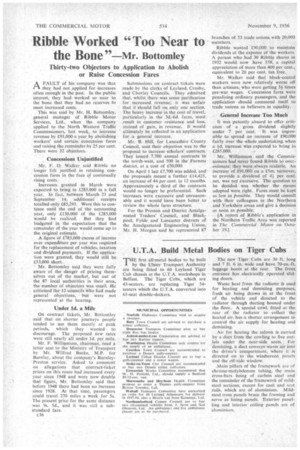Ribble Worked "Too Near to
Page 74

If you've noticed an error in this article please click here to report it so we can fix it.
the Bone"—Mr. Bottomley
Thirty-two Objectors to Application to Abolish or Raise Concession Fares
AFAULT of his company was that they had not applied for increases often enough in the past In the public interest, they had worked so near to the bone that they had no reserves Co meet increased costs.
This was said by Mr. H. Bottomley, general manager of Ribble Motor Services, Ltd., when the company applied to the North Western Traffic Commissioners, laSt week, to increase revenue by £91,000 a year by abolishing workers' and certain concession fares and raising the remainder by 25 per cent. There were 32 objectors.
Concessions Unjustified
Mr. F. D. Walker said Ribble no longer felt justified in retaining conCession fares in the face of continually rising costs.
Increases granted in March were expected to bring in 1285,000 in a full year. In fact, between March 23 and September 14, additional receipts totalled only £85,293. Were this to continue until the end of the accounting year, only £130,000 of the £285,000 would be realized. But they had budgeted in the expectation that the remainder of the year would come up to the original estimate. I
A figure of £785,000 excess of income over expenditure per year was required for the replacement of vehicles, taxation and dividend payments. If the application were granted, they would still be £33,000 short..
Mr. Bottomley said they were fully aware of the danger of pricing themselves out of the market, but out of the 87 local authorities in their area, the number of objectors was small. He criticized the 12 councils who had made general objections, but were not represented at the hearing.
Under id. a Mile
On contract tickets, Mr. Bottomley said that on shorter journeys people tended to use them mostly at peak periods, which they wanted to discourage. The proposed new rates were still nearly all under Id. per mile.
Mr. F. Williamson, chairman, read a letter sent to the Ministry of Transport by Mr. Wilfred Burke, M.P. for Rurnley, about the company's BurnleyPreston service.. Asked to comment on allegations that contract-ticket prices on this route had increased every year since 1948 and were now double that figure, Mr. Bottomley said that before 1948 there had been no increase since 1928. At that time, passengers could travel 270 miles a week for 5s. The present price for the same distance was 9s. 5d., and it was still a substandard fare.
c36 Submissions on contract tickets were made by the clerks of Leyland, Crosby, and Charley Councils. They admitted that, whilst there was some justification for increased revenue, it was unfair that it should fall on only one section. The heavy increase in the cost of travel, particularly in the 3d.-6d. fares, must result in customer resistance and loss. instead of gain, in revenue. It would ultimately be reflected in an application for .a general increase.
Mr. B. Hill, for Lancashire County Council, said their objection was to the proposal to increase scholars' contracts. They issued 7,700 annual contracts in the north-west, and 500 in the Furness district, at a cost of £50,000.
On April 1 last £7,700 was added, and the proposals meant a further £14,425, an increase of 44 per cent. in 12 months. Approximately a third of the contracts would no longer be preferential. Such increases were excessive and unreasonable and it would have been better to review the whole fares structure.
For the Preston and District Amalgamated Traders' Council, and Black; pool, Fylde and Lancaster districts of the Amalgamated Engineering Union, Mr. H. Morgan said he represented 87
branches of 53 trade unions with 20,000 members.
Ribble wanted £90,000 to maintain dividends at the expense of the workers. A person who had 30 Ribble shares in 1932 would now have 158, a capital appreciation of more than 400 per cent., equivalent to 20 per cent, tax free.
Mr. Walker said that black-coated workers were now relatively worse off than artisans, who were getting 3+ times pre-war wages. Concession fares were penalizing ordinary passengers, and the application should commend itself to trade unions as believers in equality.
. General Increase Too Much
It was patently absurd to offer criticism of a gross dividend slightly under 7 per cent. it was impossible to spread an increase of £90,000 fairly over the whole undertaking when a id. increase was expected to bring in £285,000.
Mr. Williamson said the Commissioners had never found Ribble to overestimate; they were always realistic. An increase of £91.000 on a £5m. turnover, to provide a dividend of 41. per cent. net, was riot excessive. The question to be decided.. was whether the means adopted were right. Fares must be kept as low as possible. They would consult with their colleagues in the Northern and Yorkshire areas and give a decision as soon as possible.
IA report of Ribble's application in the Northern Traffic Area was reported in The Commercial Motor on October 19.]




























































































































